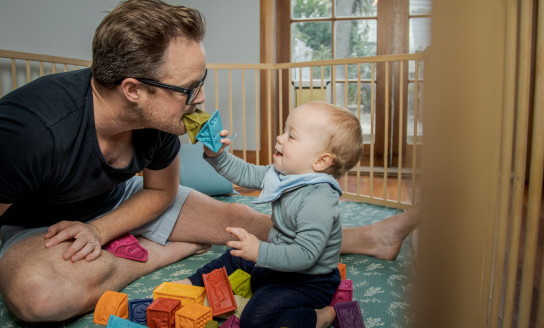Your baby's development: four to six months
Most babies this age are eating and sleeping more regularly and interacting with you and other whānau.
By six months most babies can:
- roll over
- reach and grasp for things
- chew on hands and toys
- turn towards sounds and voices
- respond to sound by making noises
- reach out for toys
- sit up
- clap hands
- can transfer objects from hand-to-hand
- play peek-a-boo
- copy you
- respond to their name
- understands "no"
- babble and may say mama, dada, bubba
- have full-colour vision.
Your baby's development: six to 12 months
By 12 months most babies:
- are curious
- crawl, bottom shuffle, or walk
- pull up to stand, or stand for a moment without support
- wave bye-bye
- respond to name
- may say words with meaning, mumma, dada, bubba
- reach out for toys and pick up small objects
- watch people and movement with interest
- follow the movement of a dangling ball in all directions
- look for hidden or dropped toys
- turn towards sounds and voices
- may understand ‘no’ and ‘bye-bye’
- copies sounds
- can say two to three words.
Things to watch for
Speak to a health professional if your child:
- isn’t moving or using both arms and/or legs
- can’t hold their head up by four months old
- isn’t sitting well by 10 months
- doesn’t want to stand up, even if you help, by 12 months
- doesn’t look at you
- doesn’t respond to seeing things
- has a lazy eye (eye turns in or out), a cross-eye, or a squint
- has unusual eye movement, like roving eyes or jerky movements
- searches with their hands without looking at the object they want
- bring objects close to their eyes
- isn’t making sounds, or doesn’t respond to sounds
- isn’t interested in what’s happening around them
- isn’t babbling by nine months.
If you notice your child isn’t developing social, communication, or physical skills at the same rate as most other children their age, your child may have a developmental delay. Delays can be short or long-term.
